Handing the microphone to Afghan women
Shazia Haya
Presenter, Open Jirga, ΒιΆΉΤΌΕΔ Media Action Afghanistan
Four Afghan women were killed in as many days in March 2021 – targeted for being women working in television and in medicine. As Afghanistan’s peace process is marked by increasing violence, we held remarkable sessions of our Open Jirga and WhatMatters2U programmes, giving women from the farthest corners of the country a voice.
The only thing more worrying than COVID-19 in Afghanistan now is the threat of bombings and violence. More than a year after the Taliban signed a deal with the United States, a wave of assassinations continues, targeting journalists, judges and activists in drive-by shootings or ‘sticky bombs’ on vehicles.
Yet, when COVID-19 travel restrictions began to lift, we knew this was our opportunity to get outside of Kabul. We wanted to give people outside the capital the chance to share their views on the peace process in our debate and discussion programmes.
For months, we had been using mobile phones and video calls to give people a platform to discuss the peace process. We wanted to do it in person – and most importantly, we wanted to focus on women, so often excluded from public discussion and left virtually invisible in Afghanistan.
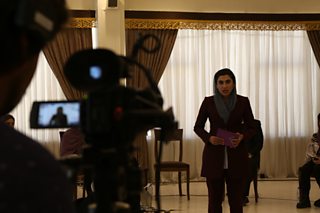
Shazia Haya opens the WhatMatters2U discussion in Herat. Credit: ΒιΆΉΤΌΕΔ Media Action Afghanistan
To the heart of the Silk Road
We started with a trip to Afghanistan’s third-largest city, Herat, in the west, 700 kilometres from Kabul. This city was at the heart of the ancient Silk Road and it is breath-taking, famous for its ancient sites, its arts and culture.
On our journey we passed four minarets commissioned 700 years ago by the powerful Mughul queen Gawhardshad Begum, which have survived decades of bombings by Soviet and then American forces. To me, they signify elegance and strength – much like the young women we were about to meet for our programmes, Open Jirga, and our new online show, WhatMatters2U, focused on young people.
In Herat, I found myself moderating a discussion among 30 young women, including small business owners, software designers, engineers, and a group of girls who are Afghanistan’s first and only girls’ robotics team.
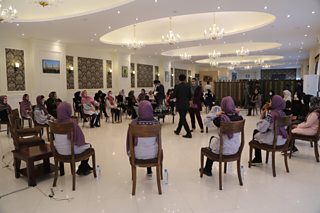
Women at a special session of WhatMatters2U, our online discussion platform, in Herat. Credit: ΒιΆΉΤΌΕΔ Media Action Afghanistan
A new generation of women
These young women represent a new generation. They have overcome deeply entrenched patriarchal culture and traditions to get an education, and to achieve in fields that are not traditional for women in even more equal societies. The fame of the girls’ robotics team has travelled far beyond the boundaries of this conservative province and even outside of Afghanistan itself.
In my work I have heard so many stories of women abused and deprived of their most basic rights – to education, to proper health care, to grow up before being married and bearing children. Herat remains deeply conservative, with some of the highest reported rates of violence against women in the country. Domestic abuse is so pervasive that the town’s main hospital even has a dedicated ward for female survivors of self-immolation – linked to severe abuse and extreme domestic violence.
And yet here stood these young women, with a line-up of high-tech devices – their creations - on display. Sumaya, the captain of the robotics’ team, proudly shared with our group a medical device first created from old car parts. “This is an alternative machine to a ventilator. We invented this to save lives during this pandemic,” she said.
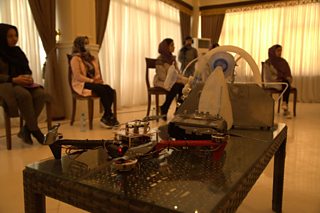
The ventilator built by the girls' robotics' team is shown at a special discussion session of WhatMatters2U. Credit: ΒιΆΉΤΌΕΔ Media Action Afghanistan
'Against the dominant beliefs of society'
But Sumaya and her team also spoke of the many hurdles that block progress for Afghan women – a feeling echoed by many of the comments during the show. We broadcast this episode as a Facebook Live which drew a quarter of a million viewers, who joined our studio audience in asking questions of these remarkable women. How might women in other parts of the country learn these skills, when so many do not have access to education? Why can women not have support to achieve in technology?
‘What we make is against the dominant beliefs in our society. Making hardware and software is not perceived as a woman’s expertise,” said one of our participants, a software designer. Despite her achievements, she too has felt limited by cultural restrictions and constant threat of violence, and said she is virtually stuck in this corner of Afghanistan. “I couldn’t go to Kabul to receive an award for one of our products, due to safety concerns and family restrictions,” she said.
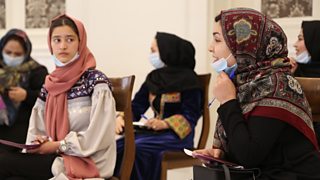
The mothers of these young women also joined the show, and I asked them what it has taken to realise their daughters’ dreams. The mother of one of the young women on the robotics team described the pain and worry she feels over her daughter’s achievements.
“When my daughter steps out of the house, and until she returns, my heart is pounding, worrying about her safety. But most painful is [knowing] the negative beliefs of society, towards girls going out of home and doing what is seen as taboo,” she said. “I have said to save the future of this country, we have to pay the price and go through endless hardship.”
The city without women
With her words in my ears, our next stop was Kandahar, 300 kilometres to the south and Afghanistan’s second-largest city. It was my first trip here and when we arrived, I thought of it as ‘the city without women’, as there were no women to be seen on the streets - women are expected to remain at home, out of sight.
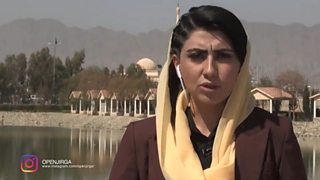
Shazia Haya opens Open Jirga in Kandahar. Credit: ΒιΆΉΤΌΕΔ Media Action Afghanistan.
This is the heartland of the Taliban, which forbids girls’ education and progress, and still controls some of its districts.
In this conservative setting, we had decided to do something unprecedented: an all-women show, inviting 50 women to ask questions of a panel that included Afghanistan’s Minister of the Economy, one of few women in Cabinet.
We expected many to refuse. Many had journeys to the studio that took them directly through areas of conflict. Yet 47 of the 50 invited women turned up. Despite the hardship and the risk, these women wanted to be heard.
The best Women's Day gift - equality
In all of our sessions, we had to take security precautions – both against COVID-19, and against the threat of violence. To protect against the virus, we held our sessions outdoors, ensured everyone washed their hands and wore masks, and ensured physical distance between guests. And to help protect these women against repercussions for participating, we invited them to keep their faces covered if they wished, and ensured none of our participants were named.
Yet few were discouraged from speaking. The best Women’s Day gift, one said, would be if her family and her society would respect her and treat her as an equal human being. Another wanted to study what she was interested in – journalism and broadcasting – instead of Islamic studies, as her family insisted.
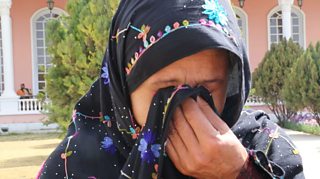
A woman from Kandahar cries as she relays her difficult journey to a special Open Jirga session. Credit: ΒιΆΉΤΌΕΔ Media Action Afghanistan
But the one whose voice will remain with me was a 40-something mother who arrived a few minutes late. She was among the first to raise her hand to speak – but when she did, she broke down in tears. Her journey to make herself heard, she said, had almost cost her her life, as she had found herself caught in an armed battle between the Taliban and government forces.
'We deserve a normal life'
“There is fighting in our district every day,” she said. “We are exhausted and shattered by bullets and bombs.”
After the show, I pulled her aside. Why had she gone through such danger to attend our show? She told me simply that she wanted our panel, and the world, to know that Afghanistan women needed to breathe. They deserve a normal life.
Open Jirga is ΒιΆΉΤΌΕΔ Media Action’s long-running debate and discussion programme covering issues of national importance for Afghans. WhatMatters2U is a social media-led debate and discussion programme aimed at young audiences, particularly women and girls. Both are funded by the UK’s Foreign, Commonwealth and Development Office.
